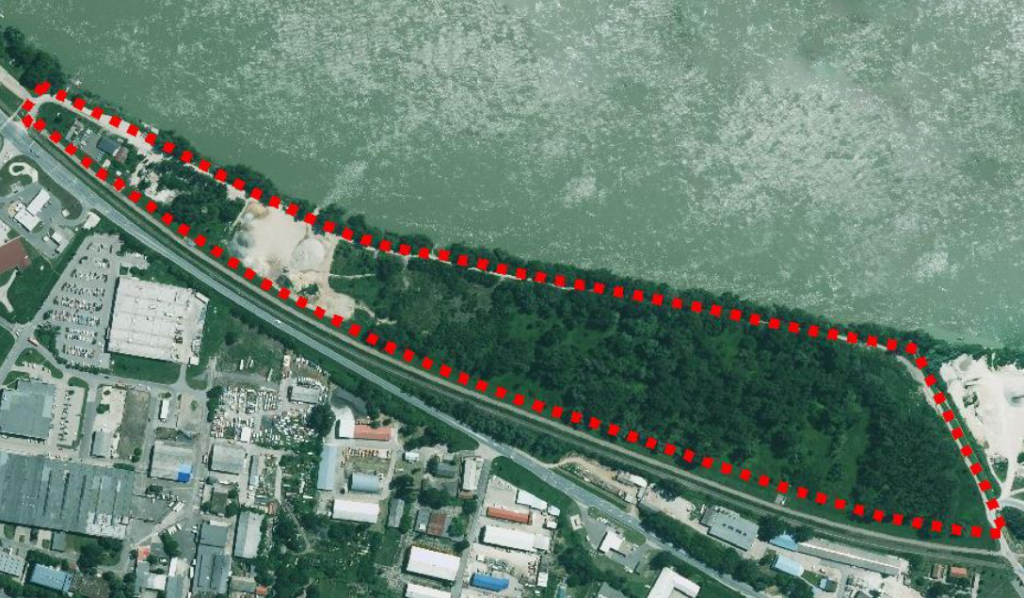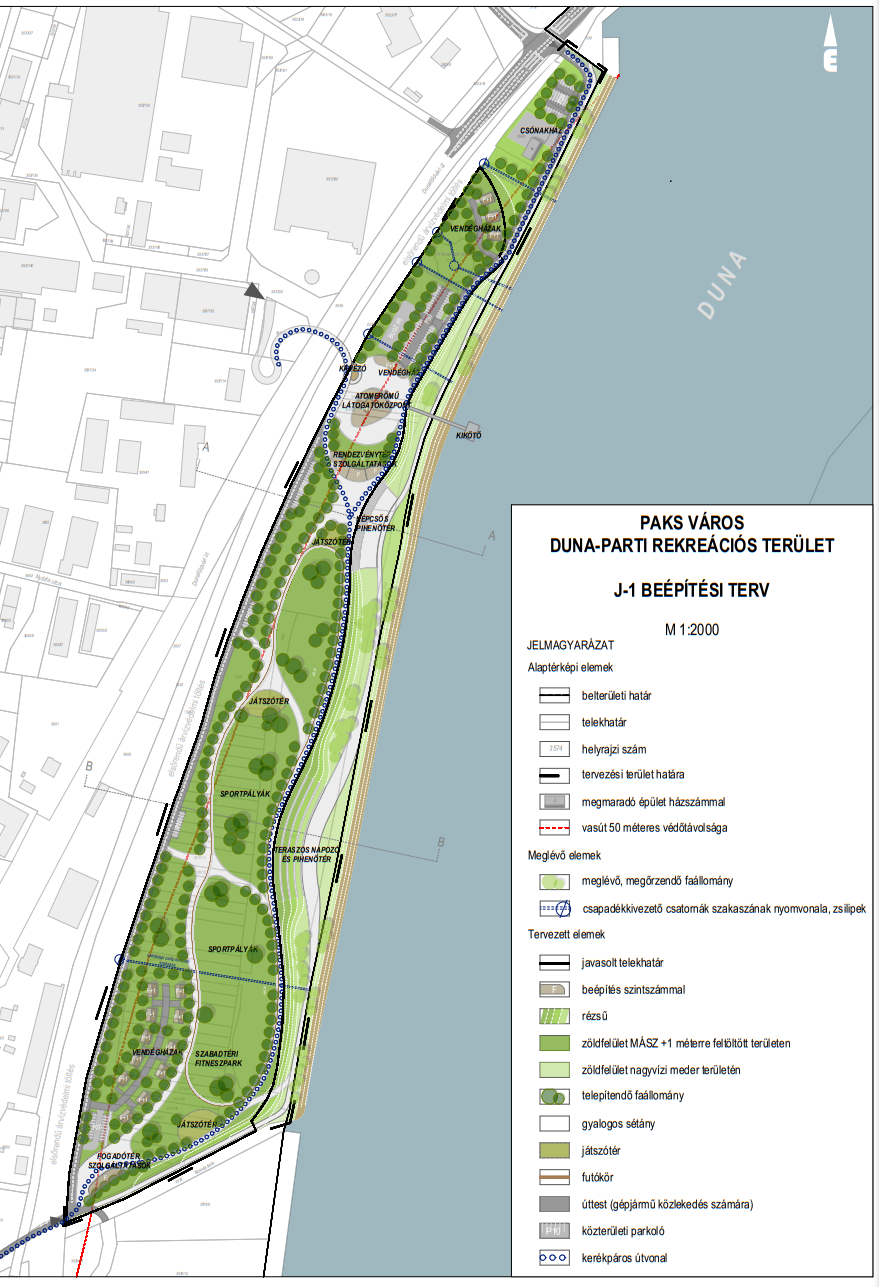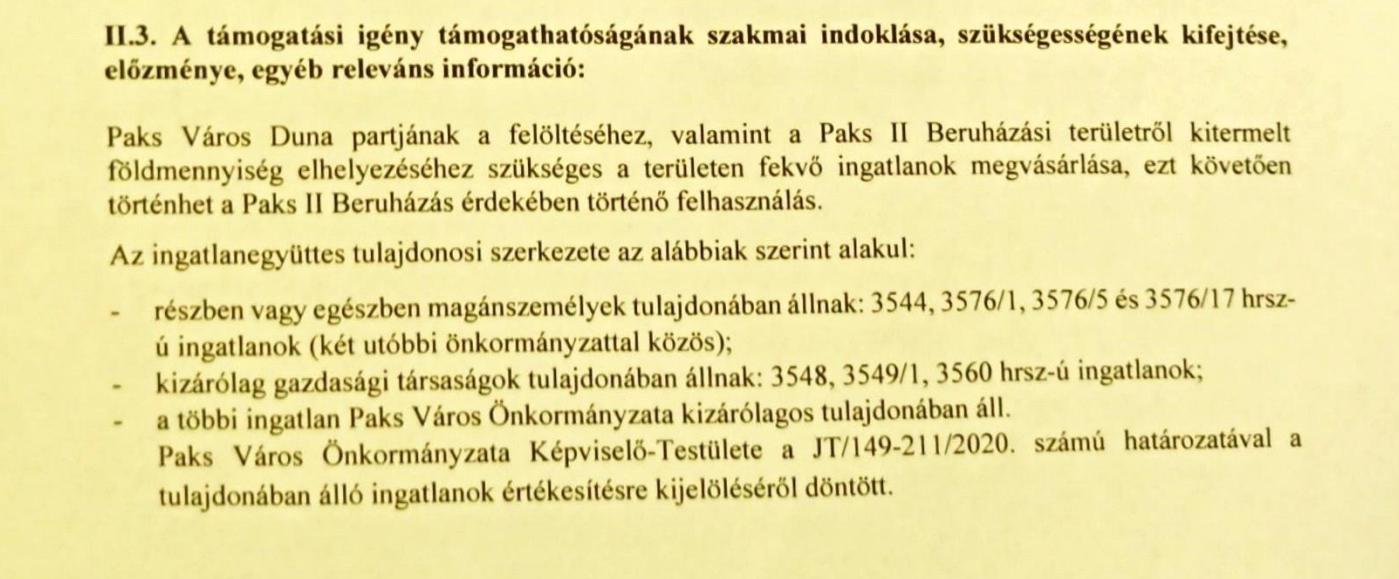The https://english.atlatszo.hu use cookies to track and profile customers such as action tags and pixel tracking on our website to assist our marketing. On our website we use technical, analytical, marketing and preference cookies. These are necessary for our site to work properly and to give us inforamation about how our site is used. See Cookies Policy
The local government would sell and demolish the Danube bank for the sake of the Paks NPP expansion
“I don’t understand all this fuss, what the hell is wrong with nearly a billion forints and a floodplain”, a Fidesz-KDNP member of the municipal council in Paks said when opposition members asked why the municipality wanted to sell a 12-hectare area of land on the Danube riverbank of Paks to a state company, and what would be built there. Although it was not clarified at the meeting, a later study reveals that a leisure park and a visitor centre for the nuclear power plant are envisaged for the site. A minor difficulty, however, is that this would require raising the floodplain by metres, i.e. filling it with about half a million cubic metres of soil. According to the idea, this huge amount of soil would be transported from the Paks II construction site and the park would, of course, be financed from the state budget. However, there has been no mention, either at the council meetings or in front of the public, of the fact that filling in the area would mean for the Danube bank to be almost completely cleared of trees.
The council meeting mentioned in the lead took place on 9 September 2020 because the state-owned Pip Nonprofit Ltd. submitted a petition to the Paks municipality that it intends to buy all properties on the South Danube bank. In the purchase offer, the company indicated specific prices (a total of HUF 798,474,800) for 52 municipal-owned plots of land with a total area of approximately 47,000 square metres. They also claimed to have the intention to buy the land not owned by the municipality (three properties are owned by companies and two by private individuals), and asked the municipality to intervene.

Pip Nonprofit Ltd. was taken over by the state in 2017 and is responsible for the implementation of project developments related to the Paks II project. Currently, the company belongs to the Prime Minister’s Office, more specifically the Minister without portfolio (i.e. János Süli) responsible for the design, construction and installation of the two new nuclear power plant units of Paks. János Süli was the Mayor of Paks from 2014 to 2017 and worked at the Paks Nuclear Power Plant from 1985 to 2011, in various positions ranging from Group Manager to CEO.
“Why do we have to do this, this circus, in committee meetings, in board meetings?”
The proposal, however, did not explain why PIP Ltd. wanted to buy the land and how it would use it. The five opposition members (Paks Deák Ferenc Association) who attended the council meeting wanted to find this out from the seven Fidesz-KDNP members, but they did not receive any substantive answer.
“When we have such an opportunity, with almost a billion forints coming into the city’s budget, then perhaps we should not be fussing about about what the hell PIP Ltd. wants. We trust PIP Ltd., we trust Minister Süli,” replied a Fidesz representative and then actually shed light on the crux of the matter: “I am looking at this amount. And it’s a very pretty sum. For an area which, at this stage, is a flood plain. Nobody in the world, apart from PIP Ltd, will ever buy it. No one could. No one would because it can’t be used at the moment.”
Representatives of the opposition asked for postponing the decision on the sale of the land, and wanted to first get to know the plans, to conclude an agreement with PIP Ltd and only then to decide on a sale or a long-term lease. However, the suggestions were not supported by Mayor Péter Szabó, and the proposal was finally voted on with 7 votes in favour and 5 abstentions.
By this, it was decided to designate the properties owned exclusively by the municipality for sale; to initiate the reclassification of public roads to private roads for public use at the Tolna County Government Office; to lift the building ban on three properties and to start negotiations for buying the private properties – in case these are unsuccessful, the municipality will apply for the expropriation of these properties to the Tolna County Government Office.
“You do nothing but work to develop the town of Paks”
The status of emergency declared because of the COVID-pandemic provided a good opportunity to avoid unnecessary hassles like the above, as during those times no council meetings could be held and mayors took over the tasks of the council. This is how Mayor Péter Szabó single-handedly classified the Paks Danube bank in question as a priority development area in a resolution of 5 May 2020, and how he also single-handedly approved the Paks Danube recreation area development plan submitted by the PIP Ltd. in March 2021.
According to the law, a development plan must be drawn up in cases where local regulations needed to be amended due to a construction project. As the submitted and adopted development plan shows, the proposed development at the Paks Danube bank would be such a case, as the planned investment could not be realised within the current land use and zoning classifications. PIP Ltd has therefore requested a change in the zoning classification as well.
The development plan finally reveals what council members had been missing earlier in the ominous board meeting, namely what PIP Ltd. would build on the Danube bank: a recreational park and a nuclear power plant visitor centre. Thus, various public recreational, leisure, educational, cultural and tourist buildings and facilities (exhibition space, lecture halls, offices, canteens, cafeterias, guest houses) would be built here, which would consist of around 1,500 m² of buildings, 50 car parking spaces and 5 bus parking spaces.
„Why do you want to prevent everything what’s good at all costs?”
The plan, however, also sets out the obstacles and problems raised by the concept.
Firstly, the Paks Danube bank is located in a national water quality protection area and in a groundwater sensitive groundwater quality protection area, and therefore has to meet more stringent requirements for utility development – currently the area is largely undeveloped.
Secondly, as mentioned before, the area is located in the flood plain, outside the primary flood protection embankment, on the unprotected side of the waterfront. That is, it is below the mean flood level, at an average height of between 90 and 94 mBf (mBf actually means metres, in relation to the mean water level of the Baltic Sea at Kronstadt). The average flood level in this section is approximately 94.39 mBf, with a safety elevation requirement of +1 metre as defined by the national regulation. The local building regulations also state that the site can only be utilised if the flood elevation is at least +1 metre above the flood level. Besides, there are various regulations imposing different flood protection restrictions and tasks, all of which affect the possibilities for land use.
The development plan also states that the elevation and filling of the area is a necessary but not a sufficient condition for its developability, as various legal modifications related to flood protection and protection of water basins set by national, regional or local regulations would also be necessary, and only then would it be possible to develop the area.
But what does raising and filling mean exactly? The development plan refers to three previous documents commissioned by the Paks municipality in 2016 and 2017. According to the technical documentation, prepared by water facility designer László Zellei, the proposed filling of the area would involve an average of 2.5 metres of soil. According to the geotechnical design documentation prepared by Vitaqua Public Engineering Ltd., the proposed filling and the subsequent use of the filling area would require the removal of all vegetation in the floodplain and would result in the deposition of approximately 0.5 million m³ of soil mass on the Danube bank.
Currently, the area is characterised by a natural stand of old-growth softwoods (black poplar) typical of floodplains, and mixed stands of mainly aspen and willow trees in the middle areas and along the Danube bank. According to the National Forest Inventory Database, the area contains three forest fragments with a primary function of embankment protection.
According to the development plan submitted in 2021 by PIP Ltd, the municipality is currently considering partial rather than full replenishment of the riverbank (in contrary to the previous plans), but this is unclear at the moment and the available materials do not indicate that this version has been technically examined in detail.
According to a Prime Minister’s Office memo obtained by Átlátszó, on 30 August 2021 János Süli applied for more than one billion, exactly 1 153 447 148 HUF, from the Deputy State Secretary of the Prime Minister’s Office in favour of the PIP Ltd. for the purchase of the properties at the southern part of the Danube River in Paks. According to the succinct justification, “the purchase of the real estate in the area is necessary for the replenishment of the Danube bank of Paks and for the disposal of the land extracted from the Paks II investment area”.
While the Paks municipality and the citizens of Paks may not object state subsidies, residents of the other three thousand or so settlements of Hungary may rightly wonder why it is necessary to finance a leisure park in Paks from the state budget, especially as most of the conditions are not provided for the project at the moment.
Neither the land, nor the land use classifications are suitable, the ownership of the property is unsettled, the Paks II project is not progressing and may never be completed (although some pits have indeed been dug). And last but not least, an area that is still left largely in its natural state and which serves a function of flood protection (because it is a function!) would have to be demolished only for the state to build cafés and exhibition halls there.
We wanted to know, among other things, how much state aid PIP Ltd has received so far for the creation of the park, the reason for financing the project from state funds, the estimated total cost of the recreational park and the funding sources, the reason why the park must be built at the Danube bank, whether the expropriation of privately owned land has already started, and how the Paks municipality will be able to influence what is actually built on the Danube if they sell their land.
Unfortunately, neither the Paks Municipality, nor PIP Ltd., nor the Prime Minister’s Office had responded to our request by the time of publication of this article.
Written and translated by Orsolya Fülöp. Additional reporting by Rita Gödri. Cover photo from the development plan. The Hungarian version of this story is available here.
Hungary. What do you know about Hungary? from atlatszo.hu on Vimeo.



